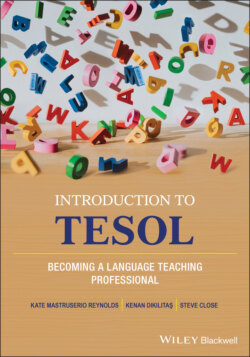Читать книгу Introduction to TESOL - Kate Reynolds - Страница 61
Organizations emphasizing second language perspectives
ОглавлениеCenter for Applied Linguistics (CAL, https://www.cal.org)—CAL is “a nonprofit organization promoting access, equity and mutual understanding for linguistically and culturally diverse people around the world” (CAL, 2019). With the broad mission to work on topics related to both ELLs and world language learners, the organization conducts and distributes research on all topics related to the study, instruction, and assessment of additional languages. For example, it has projects on heritage language learners of English, parent engagement, cultural orientation, academic learning of ELLs, vocabulary instruction, and language policy. Resources it provides include brief reports and digests (free and downloadable), books, and teacher preparation materials on video. On the website, you will also find links to over 100 organizations and foundations related to learning/teaching/assessing language and understanding culture.
The Office of English Language Acquisition (OELA, https://www2.ed.gov/about/offices/list/oela/index.html)—OELA is part of the US Department of Education. Its goal is to “provides national leadership to help ensure that English Learners and immigrant students attain English proficiency and achieve academic success” (OELA, 2020). OELA also strives to support heritage language learners and bilingual, multicultural learners. It offers reports and research to help educators and lawmakers to guide educational policy decisions in additional to providing free tool kits for teachers working with English learners, families, and newcomer ELLs. OELA works closely with the National Clearinghouse for English Language Acquisition (NCELA, https://www.ncela.ed.gov), which funds and disseminates educational research on second language acquisition and learning. NCELA offers an online searchable library with over 20,000 resources that range from curricula to classroom materials and reports, fact sheets, and multimedia products. OELA offers an annual conference for recipients of the National Professional Development grants, which fund teacher preparation to work with ELLs and research on second language acquisition and learning.
Colorín Colorado (www.colorincolorado.org)—Colorín Colorado is a relative newcomer to the field, but the organization has had a substantial impact on teachers of ELLs by offering practical, readily accessible instructional materials for immediate classroom use. Their goal is to provide resources for educators and parents on their bilingual (Spanish–English) website. For TESOL professionals, they offer streaming videos, articles, and resources that branch from ELL strategies and best practices to the specific practices themselves (e.g., lesson planning for ELLs includes selecting vocabulary, using graphic organizers, prereading a text, and writing content and language objectives), for example. In the ELL strategies and best practices section alone, there are nine overarching topics each with several concepts to be explored. The organization provides free book lists for different age groups, webcasts, and videos. Its resource library includes toolkits, policy information, research reports, and web resources. It also has recommendations for parents who are trying to help their child to read, supporting their child in their learning process, learning at home, raising bilingual children, and making informed choices when their child needs extra support.
